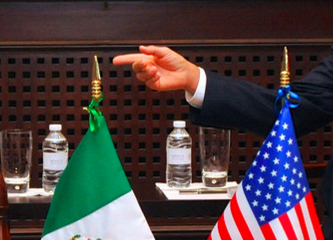The slow pace of NAFTA negotiations so far, suggests that politics will come into play pushing negotiations to 2019. The sixth round of NAFTA negotiations ended in Canada with slight progress, but without addressing any of the controversial topics raised previously by the US delegation. Stands out also that the US has not changed a bit the metric it uses to evaluate the fairness of the trade deal: the goods trade deficit. Even though we don’t agree with such a metric as it puts trade deals as a zero sum game (and the US has an overall trade deficit with the world as a consequence of consuming more goods and services than the ones produced in the US), when the real benefits are in higher employment, lower prices, higher profits on both sides of the border. Nevertheless, the fact remains that the US has a trade deficit with Mexico.
The US cannot close a deal before its November elections that does not seem clearly advantageous to them, when Republican are expected to lose the House. Trump campaign on the premise that NAFTA is a bad deal to US workers and it has to be changed or terminated. By the same token, Mexico cannot accept a deal that seems at a disadvantage to Mexico, as the Government can be severely questioned and affect its candidate going into the presidential elections. We believed Trump doesn´t want to withdrawal from the agreement before the Mexican elections as several US studies suggest that it will favor the left party in the Mexican elections and it would be preferable for the US to deal with the right for other issues like immigration border security and drugs. We also believed that Trump has listened to the Republican states like Texas, the auto industry and agriculture organizations that favor NAFTA.
After the Mexican elections, the US might try to force a deal advantageous to the US with a real threat of withdrawal. In our view, the issues and the likelihood of democrats advancing in both houses will set the tone for the aggressiveness of the US stance regarding NAFTA. In any case, we believed that there will also be pressured from the president elect in Mexico to postpone the negotiations until he sits in office. In that case, the most likely scenario is that the deal will be negotiated in 2019, either with (or without) the US already withdrawn from the deal and coming back to the table before the six month notice expires.
The silver lining of the politics of NAFTA adds new risks to the equation as we don´t know who in Mexico will end up negotiating the deal and its priorities. Also, as now the elections of Mexico go before we have a NAFTA deal, the electorate will be actually choosing the President that will negotiate NAFTA and define the foreign policy of the next six years. In this scenario, the elections become even more important than before when the expectation was for a NAFTA deal before the elections. Also, we don’t know at this point what the mandate from the electorate the next Mexican president will have. It is important to consider at this point, that Trump won the election in the US as he was able to capture the anguish of the US population against the widening of the distribution of income by blaming the political class and promising to “drain the swamp”, and against lost and better jobs by halting immigration and an America first policy of nationalism. These concerns are global, as seen defining other elections like Brexit and Mexico certainly is no exception. The time has come for Mexico to define its future.
Column by Finamex, written by Guillermo Aboumrad


